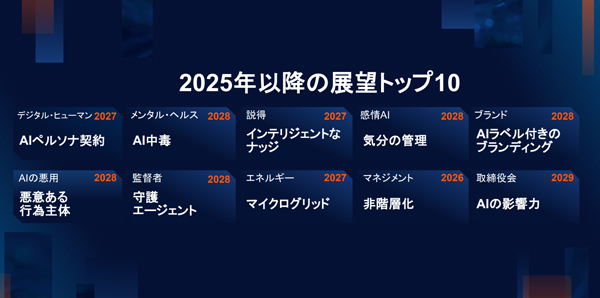Gartner predicts that 1 billion people worldwide will be addicted to digital technology

Gartner Japan has announced its top 10 strategic outlooks for 2025 and beyond. It explores how generative AI will impact people.
According to the report, by 2028, immersion in technology will affect people in the form of digital addiction and social isolation, resulting in 70% of organizations adopting anti-digital policies. It predicts that approximately 1 billion people worldwide will be affected by digital addiction, which will lead to reduced productivity, increased stress, and a sharp increase in mental health disorders such as anxiety and depression. This trend will be more pronounced among younger generations.
It is expected that the isolation caused by digital immersion will lead to employee fragmentation, and companies will see a significant drop in employee productivity. The company believes that employees will have to be required to take a period of digital detox, communication outside of working hours will be prohibited, and analog methods such as “face-to-face meetings,” “email-free Fridays,” and “lunch breaks outside of desks” will have to be forcibly reinstated.
In addition, by 2027, large companies will shift $500 billion in energy costs to microgrids, thereby mitigating chronic energy risks and AI-driven demand. Microgrids are independent power networks that connect generation, storage, and load in an energy system, and can operate alone or in conjunction with the main grid to meet the energy needs of a specific area or facility. This creates a competitive advantage in daily operations and reduces future energy risks.
The company recommends that companies should consider investing in microgrids, which provide better returns than continuing to pay rising utility bills.
By the end of 2026, 20% of organizations will use AI to flatten their organizational structures and eliminate more than half of their current middle managers. Organizations that introduce AI to eliminate human middle managers will benefit in the short term in the form of reduced labor costs and in the long term in the form of savings on employee benefits costs.
The introduction of AI can also improve employee productivity and expand the scope of management by automating and scheduling tasks, report creation, and performance monitoring.
On the other hand, there are some issues to be considered, such as “an increase in employees feeling insecure about their employment,” “managers feeling an excessive burden due to an increase in the number of direct subordinates,” and “employees becoming reluctant to bring about business transformation or accept AI-led interactions.”
Furthermore, it is expected that mentoring and learning paths will be interrupted, and many young employees may suffer from fewer opportunities for growth.
※Translating Japanese articles into English with AI
